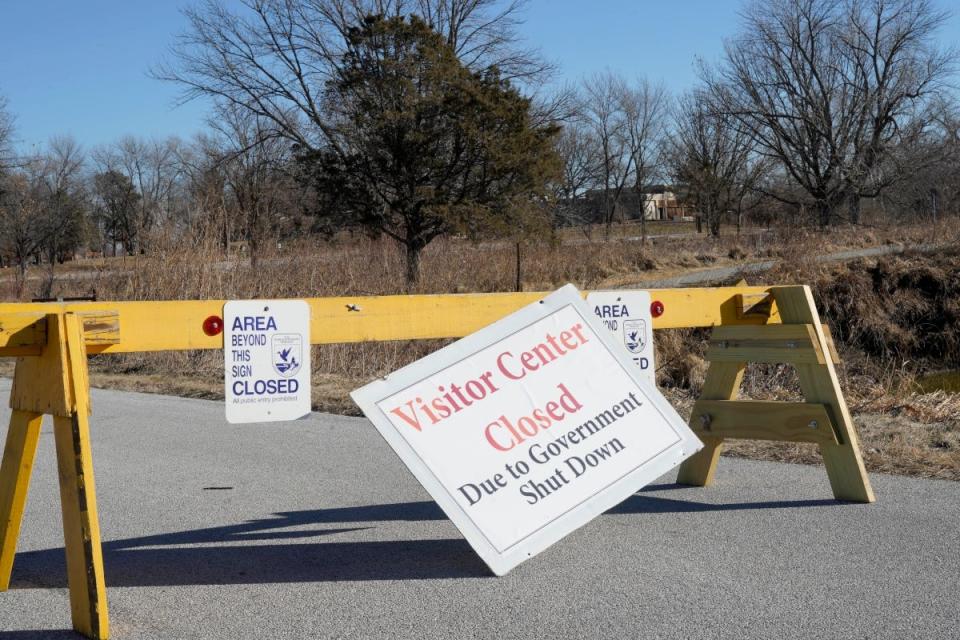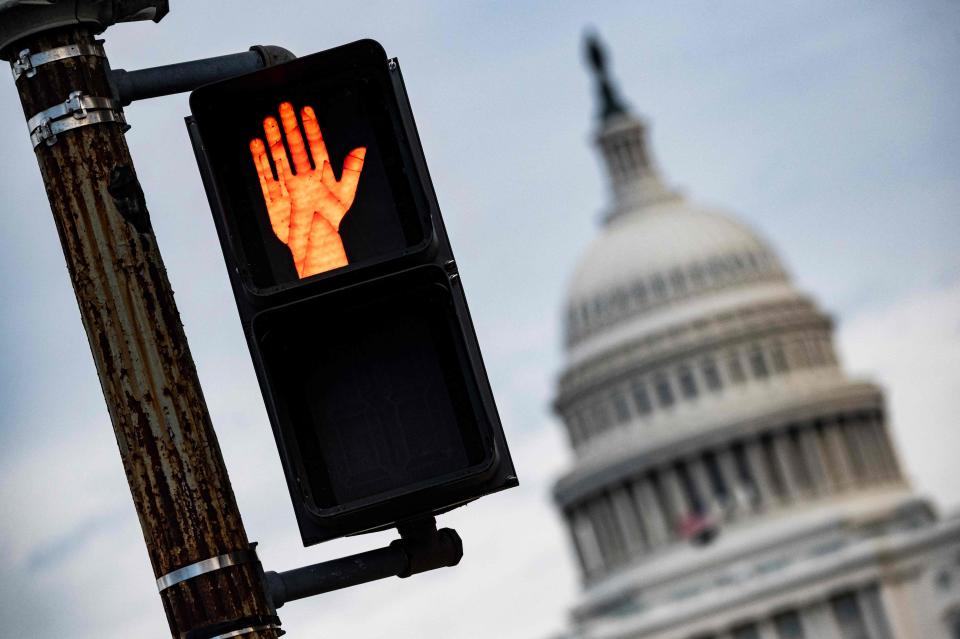A government shutdown is looming. Here's how it could affect Rhode Island.
PROVIDENCE — The groundhog day headlines — "Efforts underway to avert government shutdown" — are by now so familiar that no one in Rhode Island state or federal government is pulling the panic cord — yet.
But with a deadline looming in less than a week and no deal yet in sight, the members of Rhode Island's all-Democrat congressional delegation do not sound overly optimistic.
“It’s basic governing to pass a temporary, short-term funding bill to prevent a government shutdown so Congress can complete negotiations on full-year funding bills," Rhode Island's senior U.S. Sen. Jack Reed, a senior member of the Appropriations Committee, said in a recent statement. "Yet, House Republicans have so far shown that they are unwilling, uninterested or incapable of accomplishing this simple task.
"I hope reasonable Republicans will start working across the aisle to avoid a shutdown."

How would a government shutdown affect Rhode Island?
The implications of a shutdown are potentially far-reaching:
Tens of thousands of federal employees nationwide — including federal law enforcement; active-duty military; Transportation Security Administration, or TSA, officers; and air traffic controllers — could be forced to work without pay until funds are appropriated.
Social Security checks, mail and funds for Ukraine would still be delivered, according to reports. But nearly 7 million pregnant and postpartum recipients of supplemental food aid and their children, including 18,000 residents of Rhode Island, could lose access to the Women, Infants and Children program. And that's just one example.
"Thousands of children," Reed said, "[could] lose access to Head Start programs; FEMA’s Disaster Relief Fund could be depleted, complicating disaster relief efforts; and employers can’t access the government’s E-Verify system to assure that they are hiring legal residents."
U.S. District Court Clerk Frank Perry estimated that "the Federal Judiciary would be able to sustain paid operations for approximately two-three weeks. The funding is sufficient to cover employee salary and critical operating costs of the judiciary."
Should the shutdown extend to the point when furloughs would be necessary, Perry said the court would "determine what excepted activities are necessary to support the exercise of Article III judicial power and activities necessary for the safety of human life and the protection of property."
Asked the potential impact on R.I. campgrounds and parks, Department of Environmental Management spokesman Michael Healey said: "No impacts to either. In the case of campgrounds, the fees that DEM charge for camping go straight into general revenues.
"And practically speaking, the status of campgrounds is Burlingame, the biggest campground, closes Columbus Day; George Washington is currently closed because of the risk of EEE; and Fishermen’s Memorial (Narragansett) and Charlestown Breachway close Oct. 31."
Is a government shutdown coming? Why Republican lawmakers are split on whether to brace for impact

Is there a plan for a government shutdown?
A spokeswoman for the Rhode Island Department of Administration told The Journal: "Were a shutdown to occur, no immediate impact on state government programs is expected, although some federally funded programs and employees could be affected if a prolonged shutdown takes place."
For now, she said: "The State of Rhode Island is reviewing contingency plans and will be updating its instructions to state agencies once more federal guidance is available."
She noted that "federal programs providing essential support to Rhode Islanders [were] exempted during past shutdowns."
But at The Journal's request, she provided a copy of a memo titled "Agency Actions in response to partial federal government shutdown" that then-Administration Director Michael DiBiase sent out on Dec. 22, 2018.
It required each agency to identify "those programs, functions and employees that are funded with federal dollars and when such federal funds are expected to run out." It put contracting and hiring for federally funded goods, services and jobs on hold and warned that "layoffs may be necessary to avoid incurring costs that may not be reimbursed."
Reed: Tuberville blockade of military promotions hurts families, makes us vulnerable
Late Monday, U.S. Sen. Sheldon Whitehouse, told The Journal via email:
“It would be a shame for Rhode Islanders to have to go through another painful but preventable shutdown because House Republicans can’t get their act together. A prolonged shutdown would keep servicemembers from collecting their paychecks, delay development of critical defense technologies being built in state, and threaten nutrition assistance for the nearly 18,000 Rhode Islanders who rely on it.
"While the MAGA Chaos Caucus in the House clamors for a shutdown, the Senate is urgently working on a bipartisan solution to stave one off.”
Freshman U.S. Rep. Seth Magaziner plans to hold a press conference on Tuesday to draw attention to other potentially "devastating" impacts of what he calls a "manufactured crisis," ginned up by GOP extremists, he said, "despite the fact that both parties in Congress and President Biden already agreed to a deal on government spending levels for the coming year.
"The decision of House Republicans to back out of the deal they agreed to [earlier]," he stated, "is jeopardizing services and pay for thousands of working Rhode Islanders."
Q+A with Rep. Seth Magaziner on the shutdown
The Journal reached out to Rep. Magaziner with questions about a potential government shutdown. Here's how he responded:
How confident are you that there will be a shutdown or, conversely, that there will not be one?
Magaziner: Unfortunately, Republican leadership has refused to work with House Democrats to pass a budget and are only listening to their extremist members, some of whom have said they want a shutdown, making this manufactured crisis more likely to occur.
The only path forward is for Speaker [Kevin] McCarthy to work with Democrats on a bipartisan budget, instead of bowing to pressure from the most extreme members of the Republican caucus.
If there is one, what is the potential impact on Rhode Islanders? What will or will not be open? Who will not get paid?
Magaziner: A government shutdown would have devastating consequences for Rhode Islanders. Rhode Islanders working for the federal government, including active-duty military service members, air traffic controllers and TSA officers would be forced to work without pay.
A shutdown could also delay the processing of Social Security benefits for new retirees. Nearly 18,000 Rhode Islanders who depend on food assistance from the Special Supplemental Nutrition Program for Women, Infants and Children (WIC) — including 9,897 children and 3,970 infants — will lose this assistance once federal funding is exhausted.
A government shutdown would also endanger the safety of Rhode Islanders: OSHA would be forced to limit workplace inspections, the FDA could be forced to delay food safety inspections and most EPA-led inspections at hazardous waste sites, as well as drinking water and chemical facilities, would stop — threatening clean air, water and public heath in our state.
What would you advise the state to do in preparation for something that may or may not happen next weekend?
Magaziner: We expect that the administration will offer specific guidance to states and municipalities soon, but in the meantime, we advise the state and local nonprofits to prepare for an increased volume of Rhode Islanders seeking assistance for housing, food and other basic services as a result of having to go without federal pay or benefits.
This article originally appeared on The Providence Journal: Would a government shutdown affect Rhode Islanders? Here's what might happen

